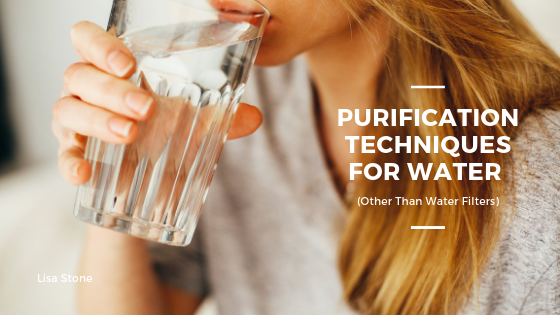If you’re ever stranded without a filter and can’t get to a filter, what can you do? Boiling works, but not for all problems and sometimes a specific temperature is needed.
Dissolving Solutions, Additives, and UV light
There are many specific products and complex techniques that can purify water, but what can you use in an emergency? Here are a few techniques that can be used or sourced during the worst of times:
- Iodine – When using iodine for water purification, keep in mind that some people may be allergic to iodine. Get an allergy test now before an emergency arises, and be sure to ask before using iodine. Allergic response is a good reason to have multiple purification methods available. Iodine is light-sensitive, so you need to store it in a dark water. Use it on water that is over 68 degrees Fahrenheit (21 degrees Celsius).
- Chlorine – If you or someone using your water is allergic to iodine, use chlorine instead. Chlorine drops and tablets are available for dilution and dissolving, and is often used in local water supplies. You may recognize the smell of pool water in some water supplies, which is an effect of chlorine. The smell is strongest when chlorine reacts with substances for a purifying effect.
- UV Light – UV light is effective against viruses, bacteria, and protozoa. Unfortunately, UV doesn’t work in all situations. The light must travel in a straight line to damage cellular structures. Cryptosporidium, Giardia, and some other microorganisms are too thick to be penetrated, which is why methods such as iodine or chlorine–as well as products advertised as effective against certain contaminants–are suggested.
The Limits of Boiling Water
Boiling water is one of the easiest and most well-known techniques to purify water, but it doesn’t purify everything. Boiling can kill many germs, pests, eggs, and other heat-sensitive contaminants.
It cannot, however, boil away things like heavy metals and some toxic liquids. While certain toxic liquids can be evaporated away or greatly neutralized by boiling, you lose a lot of your usable water in the process.
In a survival situation, you can’t easily know about contaminants unless you know how to detect contaminants. You don’t necessarily need to be a natural resource scientist, but you need to know how to use testing equipment such as litmus strips, smell, lightly taste, or visually inspect water.
Knowing about local contaminants is helpful as well. If you’re stranded in an unknown area you may not be able to get local spill information, but you should know about dumping sites, spills, and other reported contamination.
Not sure about a future camping area or worried about storms sending you into a desperate situation? Take water samples and contact private water testing firms.
Although many are rightfully suspicious of state-managed water testing reports due to the Flint, Michigan events, such cover-ups are exceptions rather than the norm. Do at least 3 tests from different sources if you want to diversify results:
- A federal or state government-level group such as the Department of Natural Resources (DNR, state) in the US. The Center for Disease Control (CDC, federal) also has information on private well water and ground water safety.
- A university or college’s agriculture department not affiliated with the government.
- A private water-testing lab not affiliated with a government organization or school.
Outside of major, proven conspiracies that haven’t been discovered, these tests will tell you about contaminants and what you can do to purify the water if necessary. If there’s no existing contamination, boiling water to get rid of germs is best.
There are more methods, and some issues are better used with filters. Filters are useless against many issues unless you can afford the massive, complex filtration methods.
Contact a water safety and clean drinking expert to learn more about water purification.
